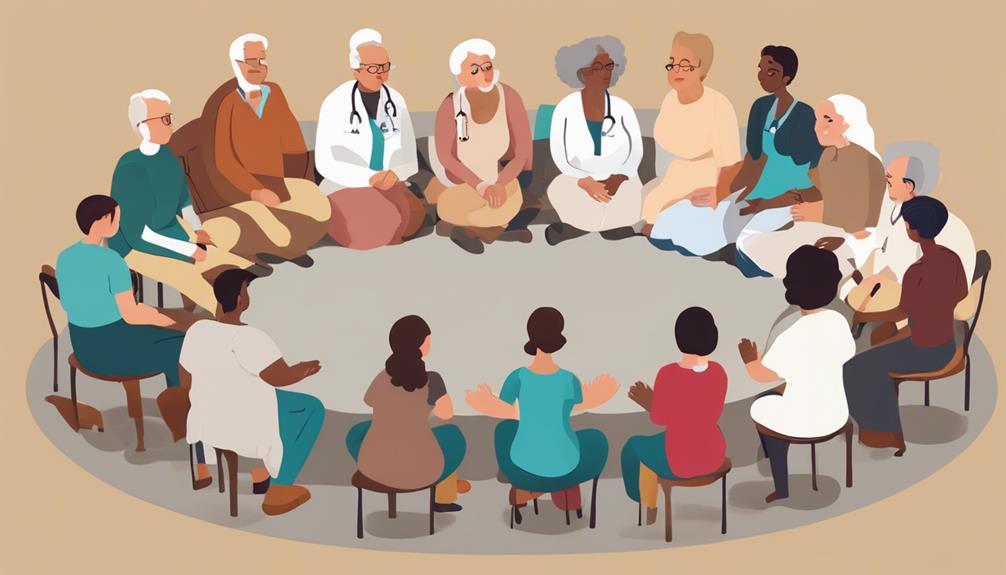In the grief stage, bargaining helps us cope with loss by negotiating with ourselves or a higher power. It's normal to feel shame, guilt, and anger during this phase. Ways to manage bargaining include seeking help, avoiding overthinking, and sharing feelings. Emotions like anguish and insecurity are common. Some might make promises to reverse what happened. Moving forward from bargaining involves accepting differences in coping and seeking support. By embracing memories and seeking professional help, healing can begin. Understanding bargaining in grief takes time and effort, but it's essential for healing and acceptance. More insights await on this important topic.
Key Takeaways
- Grief is a natural response to loss.
- Bargaining helps regain control and make sense of loss.
- Characteristics include negotiating with oneself or a higher power.
- Coping strategies: seek professional help, avoid excessive rumination.
- Common emotions: anguish, guilt, anger; making promises to reverse loss.
Importance of Bargaining in Grief
Why is bargaining in grief such an essential aspect of the healing process?
Grief is a natural response to loss, and as we navigate through its stages, bargaining emerges as a coping mechanism.
When faced with overwhelming emotions and a sense of helplessness, bargaining allows us to regain a semblance of control.
This stage is characterized by negotiating with ourselves, others, or even a higher power in an attempt to make sense of the loss we're experiencing.
By making promises to change our behavior or seeking miracles to reverse the situation, we're trying to find a way to alleviate our pain and sorrow.
Understanding the role of bargaining in grief is vital for moving towards acceptance.
It helps us process the emotional impact of our loss and gradually come to terms with our new reality.
Embracing this stage with patience and self-compassion can lead us on a path towards healing and eventual peace.
Characteristics of the Bargaining Stage

During the bargaining stage of grief, individuals engage in negotiations with themselves, others, or a higher power to delay or reverse the inevitable loss. This stage involves feelings of shame, guilt, anger, resentment, betrayal, and desperation.
Bargaining behaviors may include making deals with a higher power to change outcomes or seeking ways to feel better. Bargaining serves as a coping mechanism to regain control, offer hope, and distract from emotional distress.
The duration of the bargaining stage varies among individuals and can last for minutes, hours, or longer. It's important to recognize that bargaining is a natural response to loss and can help individuals process their emotions in a healthier way.
Coping Strategies for Bargaining
When traversing the bargaining stage of grief, adopting coping strategies can provide individuals with a sense of control and support as they process their emotions. During this challenging time, it's essential to hold onto hope and understand that feelings of bargaining tend to decrease over time.
Here are some coping strategies to help manage pain and navigate through the bargaining stage effectively:
- Seek professional help: Consulting a therapist or counselor can offer valuable support and guidance.
- Avoid rumination: Try not to dwell excessively on the 'what ifs' and focus on the present moment.
- Practice reflection: Writing down your thoughts and emotions can aid in understanding and processing your feelings.
- Focus on controllable aspects: Shift your attention to things you can influence rather than those beyond your control.
- Reach out for support: Don't hesitate to lean on friends, family, or support groups for assistance during this difficult period.
Common Emotions in Bargaining

Traversing through the bargaining stage of grief can evoke a myriad of common emotions, including anguish, shame, guilt, self-loathing, anger, resentment, feeling betrayed, desperation, and insecurity. During this phase, individuals may grapple with intense feelings of guilt and shame as they attempt to negotiate with themselves or a higher power.
Bargaining, a coping mechanism, emerges as a way to regain a sense of control, offer hope for a positive outcome, and divert attention from the emotional distress that comes with grief. This negotiation process can lead to self-loathing and insecurity as individuals reflect on 'what if' scenarios and attempt to alter past events.
The duration of the bargaining stage varies from person to person, with some experiencing it for minutes, hours, or even longer periods. As individuals navigate through these complex emotions, it's important to acknowledge and address the feelings of guilt, shame, self-loathing, and insecurity that may arise during this critical stage of the grieving process.
Examples of Bargaining in Grief
When grieving, examples of bargaining may include:
- Making promises to a higher power
- Imagining alternative scenarios in which the loss could be undone
These behaviors serve as coping mechanisms, offering a sense of control and hope in a challenging time.
Common Bargaining Behaviors
In the domain of grief, individuals commonly exhibit bargaining behaviors as a way to navigate their loss and seek solace. Here are some common bargaining behaviors that people may display during the grieving process:
- Making promises to be a better person in exchange for reversing the loss.
- Seeking to trade places with the deceased or wishing for a miracle to undo the loss.
- Making deals with a higher power to change outcomes or alleviate pain associated with the loss.
- Engaging in rituals, prayers, or superstitious behaviors to cope with grief.
- Expressing common statements like 'If only I'd done something differently, this wouldn't have happened' or 'Please, just give me one more chance.'
Coping Strategies During Bargaining
During the bargaining stage of grief, individuals often employ coping strategies to navigate their emotions and seek solace amidst their loss. Coping strategies serve as a defense mechanism against feelings of helplessness and provide a sense of control during the grieving process. These strategies may include normalizing the behavior, managing emotional pain, seeking professional help, and avoiding excessive rumination.
Understanding the Bargaining Process

As we explore the bargaining process, we'll analyze different strategies individuals use when negotiating with themselves, others, or a higher power.
Through this exploration, we aim to understand how bargaining serves as a coping mechanism and provides insights into emotional negotiations.
Bargaining Strategies Analysis
Utilizing various techniques to navigate the bargaining stage, individuals engage in a strategic analysis of their coping mechanisms and negotiation processes to address loss effectively.
- Reflect on past bargaining attempts: Looking back at previous deals made in times of grief can help us understand our coping patterns.
- Seek support from others: Sharing our struggles and strategies with trusted individuals can provide comfort and new perspectives.
- Practice self-compassion: Being kind to ourselves during the bargaining stage can ease the burden of guilt and shame.
- Explore creative outlets: Engaging in activities like art, music, or writing can help channel emotions and facilitate the bargaining process.
- Set realistic goals: Establishing achievable objectives while bargaining can maintain a sense of control and foster hope for the future.
Coping Mechanisms Exploration
Reflecting on past bargaining attempts sheds light on our coping mechanisms, paving the way for a deeper understanding of the bargaining process and how we navigate through grief.
During the bargaining stage, individuals may experience emotions such as shame, guilt, anger, and betrayal. These feelings often lead to negotiation, a defense mechanism used to combat helplessness and regain a sense of control. Coping mechanisms in this stage can involve making promises to improve oneself or hoping for miraculous outcomes.
The duration of the bargaining stage varies from person to person; some may go through it for minutes, hours, or even longer. By recognizing and exploring these coping mechanisms, we can better comprehend the complexities of grief and how we cope with loss.
Emotional Negotiation Insights
During the bargaining stage of grief, we engage in emotional negotiations with ourselves, others, or a higher power in an attempt to delay or reverse the inevitable loss.
Here are some emotional negotiation insights to help you navigate this challenging phase:
- Seeking control in a situation where control may feel lost
- Holding onto hope for a positive outcome amidst emotional distress
- Using bargaining as a coping mechanism to deal with overwhelming emotions
- Considering personal factors that influence the duration of the bargaining stage
- Understanding that bargaining is a natural part of the grieving process and can vary in intensity and duration for each individual.
Duration of Bargaining Stage

The duration of the bargaining stage in grief varies greatly among individuals, ranging from mere minutes to extended periods. This stage is an essential part of the grieving process, where individuals attempt to negotiate with their emotions and the reality of their loss. Factors such as personality, resilience, and the nature of the loss can influence how long someone remains in the bargaining stage.
Additionally, cultural background can play a significant role in shaping the intensity and duration of this stage in the grief journey. Effective coping strategies are essential during this time to help individuals navigate the emotional turmoil and gradually progress in their healing process. Seeking professional help may also be necessary for those finding it challenging to move past this stage, as it involves accepting the permanence of the loss and coming to terms with reality. Understanding that the stages of grief and loss are unique to each individual is crucial, as everyone processes emotions differently based on personal experiences and support systems. While some may find solace in community or spiritual practices, others might rely on creative outlets or mindfulness techniques. Ultimately, acknowledging and working through the stages of grief and loss allows individuals to rebuild their lives and find a renewed sense of purpose over time.
Challenges in Moving Past Bargaining

When addressing the challenges of moving beyond the bargaining stage, it's important to recognize that each person deals differently with loss.
Embracing the process of acceptance and giving oneself time for healing are vital steps in maneuvering this phase.
Keep in mind, seeking support from loved ones or professionals can offer valuable aid in the journey towards acceptance and healing.
Coping With Loss
Traversing the journey through grief involves addressing the challenges of progressing past the bargaining stage, which necessitates recognizing the permanence of loss and embracing the reality that unfolds. When coping with loss, remember:
- Acceptance is a gradual process, and it's okay to take your time.
- Seeking professional help is a sign of strength, not weakness.
- Individual factors like resilience and personality influence how we grieve.
- Effective coping strategies, such as talking to loved ones, can ease the pain.
- Remember that the stages of grief are unique to each person; there's no right or wrong way to feel.
Acceptance and Healing
Traversing the journey through grief involves facing the challenges of acceptance and healing, especially in moving beyond the bargaining stage. Acceptance in grief means gradually easing the pain and learning to live with the loss, focusing on moving forward.
Healing requires accepting the loss, reflecting on emotions, making productive changes, and seeking support for coping. Embracing memories of the deceased while finding ways to move forward is important for healing and acceptance.
Understanding controllable aspects and accepting the grieving process are key steps towards healing and moving past the bargaining stage. Seeking support, managing pain, and avoiding excessive rumination play a significant role in facilitating acceptance and healing in the grief journey.
Seeking Professional Help for Bargaining

In the midst of grief's bargaining stage, seeking professional help offers valuable support and guidance for maneuvering through this challenging emotional process. Grief counselors can provide specific strategies and interventions tailored to managing the complexities of bargaining. Professional therapists assist individuals in processing their emotions, thoughts, and behaviors associated with grief's bargaining stage. Mental health professionals help in developing coping skills essential for promoting emotional healing during this phase. Grief support from trained professionals plays a critical role in aiding individuals to move towards acceptance and find peace after experiencing loss.
- Professional help offers tailored strategies for managing grief's complexities.
- Therapists assist in processing emotions and behaviors related to bargaining.
- Mental health professionals aid in developing essential coping skills for healing.
- Grief support from trained professionals is crucial for finding peace after loss.
- Seeking help from counselors promotes emotional healing and acceptance.
Healing and Acceptance After Bargaining

After passing through the negotiating stage of grief, the journey towards healing and acceptance begins with gradual recognition of the loss. Acceptance is an important step in the healing process following negotiation, where one must come to terms with the reality of the loss. This period can be painful but is vital for moving forward.
Reflecting on emotions and making constructive changes are key aspects of this phase. Seeking support from loved ones or professionals can provide comfort and guidance during this time. By focusing on controllable factors and accepting the grieving process, individuals can facilitate their own healing.
Emphasizing support and positive changes aids in shifting towards acceptance and healing after experiencing the negotiating stage in grief.
Frequently Asked Questions
What Does Bargaining Mean in the Stages of Grief?
In the stages of grief, bargaining involves negotiating with oneself, others, or a higher power to change or reverse the loss. It helps us cope with helplessness and regain control, offering temporary relief from emotional turmoil.
How Should You Deal With This Bargaining Stage?
When dealing with the bargaining stage, we should acknowledge our emotions, seek support, and practice self-compassion. It's important to give ourselves time to process and move through this stage as we journey towards acceptance and healing.
What Are the 5 Stages of Grief Breakup Bargaining?
When dealing with breakup bargaining, we often cycle through stages like denial, anger, bargaining, depression, and acceptance. Bargaining entails seeking ways to change the past, hoping to rewrite our story with a different ending.
How Do You Not Let Grief Consume You?
We manage grief by acknowledging feelings, practicing self-care, seeking support, and establishing routines. By engaging in these actions, we prevent grief from overwhelming us and navigate the process with resilience and strength.
Conclusion
To sum up, bargaining is like a negotiation with our emotions during the grief stage. It's a natural part of the healing process, where we try to make sense of our loss and find ways to cope.
By recognizing and addressing these feelings, we can move towards healing and acceptance. Remember, it's okay to seek support from others and professionals as we navigate through this challenging time.
Stay strong and be kind to yourself as you journey through grief.









